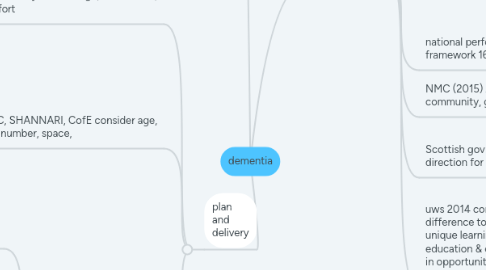
1. professional development
1.1. health promotion/ education-UWS/NMC/
1.2. professionalism nmc - uphold professionalism and standards of code
1.3. team work nmc - work cooperatively, respect, work together, share, learn, allowed to share knowledge,
1.4. interpersonal skills- built rapport with team and clients, trust
1.5. develop leadership skills
2. background
2.1. UNCRC 1992- uphold rights of children
2.2. GIRFEC
2.2.1. national approach to reforming childrens services to improve outcomes. provides strategic policy and framework for all (CofE)
2.3. CofE 2008
2.3.1. everything planned in and out of class
2.3.2. 4 areas: curriculum area and subjects, interdisciplinary learning, ethos and life of the school opportunities for personal achievement
2.4. shannari
2.4.1. everyone responsible for childs wellbeing and is at centre - 8 indicators- safe, healthy acheiveing, nurtured, active, respected, responsible, inlcuded
2.4.2. links HWB, GIRFEC, UNCRC
2.5. national performance framework 16
2.6. NMC (2015) Act within code - education, community, group
2.7. Scottish gov 14 (setting the direction for nurses
2.7.1. Scottish gov 13-16 national dementia strategy - 8 pillar model of community support, educate, dementia friendly
2.8. uws 2014 corporate strategy (making a difference to communities in Scotland and unique learning opportunities) & education & enabling plan 15-20 9 invest in opportunities, formal and informal learning
3. plan and delivery
3.1. engaging leadership approach - harnesses power of individual to work effectively - encourage, be decisive, team effort
3.1.1. team formation- Tuckman 1959 forming, storming, norming, performing
3.1.2. berlo 1960 sender- message-channel-receiver (communication)
3.2. GIRFEC, SHANNARI, CofE consider age, ability, number, space,
3.2.1. NHS Scotland quality strategy person centred safe effective - consider role (educate) 20:20 live longer at home, safe,
3.2.2. representing uws/nmc
3.2.3. madylus - 11 year- longer attention span, can be challenged, more serious about learning
3.3. SMART (activities/plan
3.3.1. team teaching
3.3.1.1. traditional dialect transmission (powerpint/ lecture)
3.3.2. biggs (03) constructive alignment theory- purposefully linked activities to learning outcomes
3.3.3. online material-quiz
3.3.3.1. evaluate- A3 approach- plan (change)-do(implement)-study( analyse)-act( what next)
3.3.3.2. pender health promotion model focuses on individual characteristics, behaviour specific cognitions, behavioural outcomes, nurses influence people throughout life span- health promoting activities

